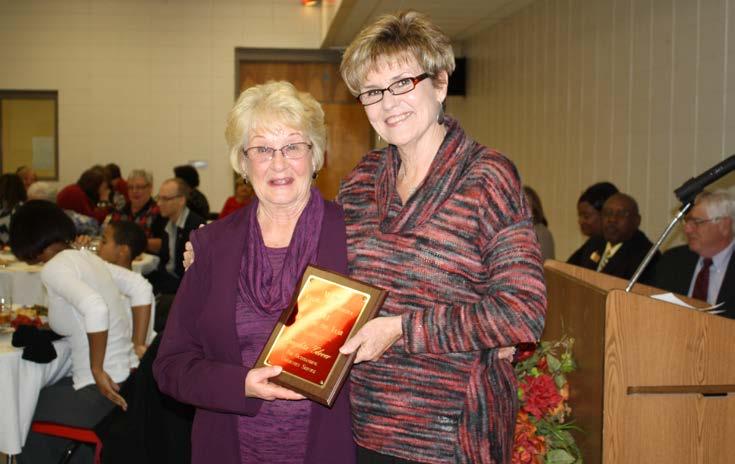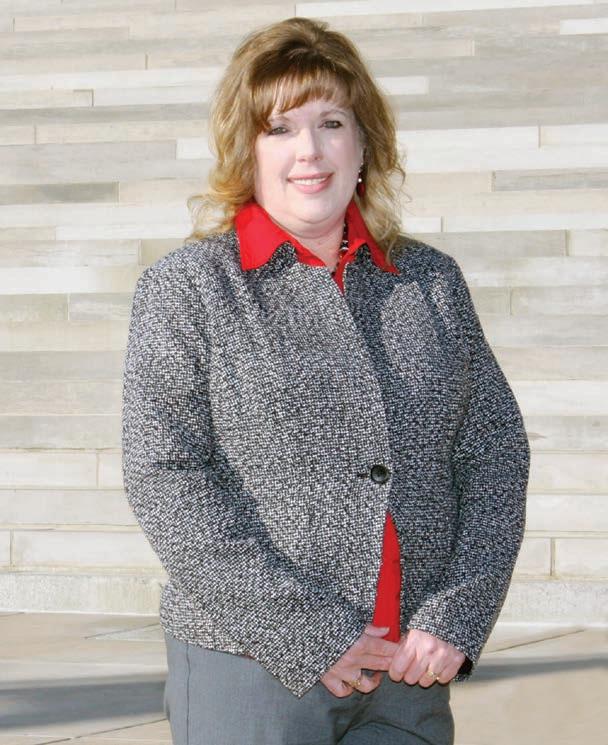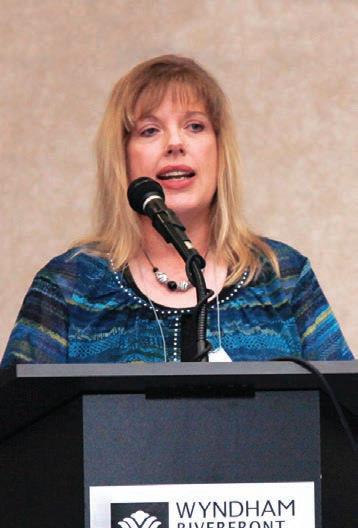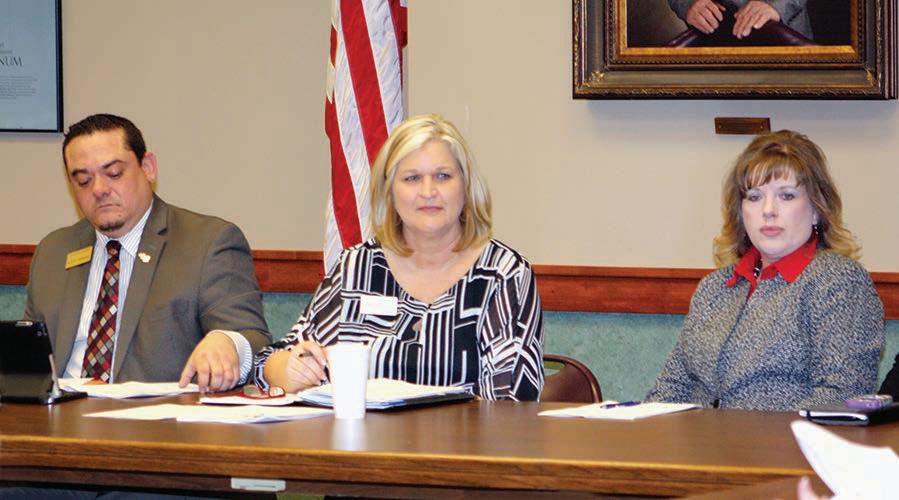
13 minute read
Desha County Collector named Woman of the Year
White County Courthouse has benefited from 10 AHPP restoration grants
Among the many programs and services of the Arkansas Historic Preservation Program is the County Courthouse Restoration Grant Program. Created in 1989, this grant program has helped to extend the lives of courthouses that hold vital links to community pride and local history. These grants are funded through the Real Estate Transfer Tax, administered by the Arkansas Natural and Cultural Resources Council. Since the beginning of the program, the AHPP has awarded more than $18.6 million to 69 historic courthouses and courthouse annexes around the state for use in rehabilitating, preserving and protecting these important historic resources. Since 1991, White County has received 10 grants totaling $293,204 for the White County Courthouse.
FY1991 Waterproofing Basement $10,000 FY1992 Waterproofing Basement and Parapet Walls $21,075 FY1993 Repaint Exterior $7,500 FY1995 Restore Interior Walls and Ceilings $3,500 FY1997 Install Chairlift $20,250 FY1999 North/South Porch Roofs; Paint Clock Tower $35,679 FY2009 Exterior Painting $42,000 FY2012 Roof Restoration $80,000 FY2013 Finish Roof Restoration $48,200 FY2015 Repair Chairlift $25,000
The AHPP also awarded White County a $33,100 County Courthouse Restoration Grant in FY2002 to make the restrooms at the 1914 Searcy Post Office at Gum and Arch streets accessible to handicapped citizens and to install storm windows at the building, which was listed on the National Register of Historic Places on July 20, 1992. The building now serves as a courthouse annex: the Wilbur D. Mills Courts Building, housing the county’s circuit, chancery and probate court offices.
The White County Courthouse and its clock tower
were designed by H.L. Baldwin of Memphis. The bell in the tower, which was refurbished in 1999 using a $35,679 Restoration Grant, dates back to 1855.
Desha County Collector named Woman of the Year in 2014

Desha County Collector Vaughta Glover was named Woman of the Year by the McGehee Chamber of Commerce in a ceremony that took place in November 2014. In announcing the award, LeeAnn Reed, who works in the collector’s office, recounted Glover’s years of community service. Glover’s first term as county collector began in January 1997. She has organized reunions for many groups, including the 60th Anniversary Celebration at her church, Antioch Baptist Church. Glover also organizes the county courthouse team for the annual Desha County Relay for Life, and she is an active member of the McGehee Women’s Chamber of Commerce. In 2002, Glover was first elected by her peers to serve on the board of directors of the Arkansas County Tax Collectors Association. She has served as the association’s second vice-president.
Some options are irresistible
Fiduciary assistance and a zero-fee option for smaller public sector plans? Sweet.
Nationwide’s new 457(b) options offer smaller plans features normally only available to larger entities. Now more of the public sector can benefit from Investment Fiduciary Services provided by Morningstar Associates and a zero fee administration option — which makes life a little easier for plan sponsors while putting retirement within reach for participants.

Let’s talk about putting our new offerings to work for your plan.
Contact Linda Barber: 1-614-435-8328 barberl@nationwide.com NRSforU.com/plansponsor
Information provided by Retirement Specialists is for educational purposes only and not intended as investment advice. Retirement Specialists are registered representatives of Nationwide Investment Services Corporation, member FINRA. Nationwide Retirement Solutions, Inc. and its affiliates (Nationwide) offer a variety of investment options to public sector retirement plans through variable annuity contracts, trust or custodial accounts. Nationwide may receive payments from mutual funds or their affiliates in connection with those investment options. For more detail about the payments Nationwide receives, please visit www.NRSforU.com. Nationwide Retirement Solutions, Inc. and Nationwide Life Insurance Company (collectively “Nationwide”) have endorsement relationships with the National Association of Counties and the International Association of Fire Fighters – Financial Corporation. More information about the endorsement relationships may be found online at www.nrsforu.com. Investment advisory services are provided by Morningstar Associates, LLC, a registered investment advisor and wholly owned subsidiary of Morningstar, Inc. Neither Morningstar Associates, LLC nor Morningstar, Inc. is affiliated with Nationwide or its affiliates. The Morningstar name and logo are registered marks of Morningstar, Inc. Nationwide and the Nationwide framemark are service marks of Nationwide Mutual Insurance Company. © 2013 Nationwide Retirement Solutions, Inc. All rights reserved. NRM-9664M1.NX (05/13)

— Terri Harrison Polk County Clerk
Getting the job done
Polk County Clerk Terri Harrison lets the law, not politics, be her guide
By Jennifer Barnett Reed For County Lines
Arkansas’ county clerks often find themselves in the middle of contentious issues, and 2014 was no exception. As state legislators and judges debated voter ID laws and same-sex marriage, Polk County Clerk Terri Harrison and her compatriots worked the front lines. They’re the ones who told voters on election days whether they had to show a driver’s license to cast a ballot. And it’s to their offices that same-sex couples came to apply for marriage licenses.
None of that contention bothers Harrison. Now in her eighth term as clerk of Polk County and her second year of a two-year term as president of the Arkansas Association of County Clerks, Harrison said she instead simply focuses on what the law requires – even if that changes from one week to the next.
“As county clerk, I don’t feel like the partisan politics plays into my job much,” she said. “We have a law that tells us how to do every aspect of our job. It doesn’t really matter how you feel party-wise. We have a job to do.”
It’s a job Harrison has been doing since 2001, shortly after she was elected to replace the retiring county clerk who had been Harrison’s boss for seven years.
“It’s kind of funny — when I first went to work [in the county clerk’s office], my father-in-law said, ‘You can work for her for a few years, and when she’s ready to retire, maybe you’ll want to run,’” Harrison said. “I didn’t think that was something I would ever want to do. Then I discovered how much I really, really enjoyed it.”
The idea of campaigning made Harrison a little nervous, she said — she had opposition in both the primary and general elections — but that didn’t last long.
“The people in Polk County were so good to me,” she said of that campaign. “I really enjoyed getting out and visiting with people.”
Harrison, 44, is a native of Polk County. She graduated from Acorn High School in 1988 and attended community college in Mena for a couple of years before going to work in the county clerk’s office in 1994. Her husband, John, works for Brodix, a local manufacturer of cylinder heads. They have a daughter in high school and a son in college.
In the 21 years she’s worked in the county clerk’s office, she’s seen an enormous amount of change.
“When I first started working for the county, and even when I first became clerk, all the voting was done by paper ballot,” she said. “We had a central tabulator at the courthouse. People in charge of the polling places would bring ballots in


Opposite page: Polk County Clerk Terri Harrison attended a Senate committee hearing at the state Capitol in February. This page, left: Harrison is president of the Arkansas Association of County Clerks and leads the group’s continuing education meetings. This page, right: AAC Communications Director Scott Perkins, AAC Legislative Chair Debbie Wise and Legislative Committee member Harrison hear updates on county-friendly legislation at a February meeting.
to the courthouse.”
That began to change in the wake of the Help America Vote Act, which was passed in 2002. The law required states to update their election processes, and the Polk County Election Commission decided to go with electronic voting machines, beginning in the 2006 elections.
“That was a little bit of a challenge,” Harrison said. “There was a lot of voter education that had to go into it as well.”
Harrison and her small staff went to public meetings, the county fair, meetings of civic groups and any other place that invited them to demonstrate the new machines before they were actually used in any election.
“That put the public’s mind at ease,” she said. “Once the voters started voting on the machines, they loved it.”
So did poll workers.
“It does save a lot of time on election night,” she said. “Before my time, poll workers would count ballots at the polling place before they brought them in. Now all they have to do is shut the machines down and turn them in to us.”
In 2014, Polk County started using electronic poll books as well, Harrison said. That sped up the process of getting the names of people who voted into the system. And the Secretary of State’s office has begun researching new voting equipment to replace the aging machines currently in use.
“Right now there’s a lengthy opening process that poll workers have to go through, and we’re hoping the new machines will be a little more user-friendly for the poll workers,” she said.
Voter ID laws, though, have been the biggest election-related challenge for Harrison’s office recently. Poll workers there had always asked voters to show ID, and most voters were used to it, she said, so when legislators passed a law requiring voters to show ID, there wasn’t much of a transition.
“Now that the ID law is reversed, we’re not currently doing it,” she said of asking voters for ID. “But I still feel like they will use their driver’s license for ID because they’ve always done it.”
There was some confusion, Harrison said, but poll workers didn’t report a lot of it. A handful of voters mentioned that they’d heard they didn’t have to show ID anymore, but most didn’t seem to be aware of the change.
“Most people pretty much just go with the flow, and they’re used to showing their ID, so they have it out and ready,” Harrison said. “Most of the time we didn’t even have to ask for it.”
Even with the changes, Harrison said, elections are her favorite part of the county clerk’s duties.
“It’s interesting the way it works,” she said. “I feel strongly about making sure it’s done correctly and fairly. At the end of the night on election night, I’m always anxious to see how it turns out, and find out how things went throughout the day for the poll workers.”
The results of this past election were historic for Arkansas, of course, with Republicans sweeping every state office and a majority of seats in the state House and Senate. As president of the county clerks association, Harrison has been following any bills that would affect elections, marriage licenses or other aspects of the county clerk’s duties, and would be involved in working with legislators on those bills on behalf of the association. She’s hoping her status as a registered Democrat won’t be a drawback.
“I’ve always tried very hard not to let that be an issue,” said Harrison, who has been unopposed in every campaign after her first one. “I’m willing to work with people. It doesn’t matter if you’re a Democrat or a Republican — I just want to do what’s in the best interest of our people and our county. I’m willing to sit down and work with you — it doesn’t matter what party you’re with.”
Still, she knows debates about election laws tend to bring out the partisan politics.
“We just have to work together and try to come to a solution that’s in the best interest of the people of the state, and figure out a way to make it work,” she said.
Little River County Clerk Deanna Sivley, who is secretary of the Arkansas Association of County Clerks, said she has no doubt Harrison will be a strong advocate for the association’s issues with the legislature.
“She’s pretty quiet most of the time, but she’ll surprise you,” Sivley said. “She’ll stand up when it’s called for.”
As the association president, Harrison shares what she thinks about issues but always makes a point of getting input from others, Sivley said.
“I think she’s done a great job for us,” she said.
Harrison said she’s not aware of any bills at this point that the association would be strongly for or strongly opposed to.
That doesn’t necessarily mean the state’s county clerks won’t be dealing with any hot-button issues this year. The state Supreme Court will be hearing arguments on an appeal of a lower court’s ruling that the state’s ban on same-sex marriage is unconstitutional. During the brief time that the lower court’s ruling stood last year before the Supreme Court stayed it pending the appeal, county clerks around the state differed in how they said they would handle same-sex couples applying for marriage licenses.
“We’re just waiting to hear what happens with that,” Harrison said. “We’ve not had a lot of phone calls in Polk County with people inquiring about it. If and when that decision is made, it’s something that will probably take some education and people having to get used to it.”
Either way, Harrison said, she sees her role as county clerk to carry out the law, period.
“I feel like when I took my oath as county clerk I agreed to uphold the law and do what the law instructs me to do,” she said. “I don’t feel like personal beliefs can influence that. In our office we discussed that regardless of whether we’re for or against it, if the law changes and that’s what we’re required to do, that’s what we’re going to do in our office.”
In the meantime, there are plenty of other changes to keep Harrison on her toes. When Harrison started in the Polk County Clerk’s office as an assistant in 1994, all records were kept on paper only. In the years since, the office has become gradually more reliant on computer records. Last August, they took one more step in that direction, migrating onto the state’s Context system for probate files.
“None of those had ever been done electronically — they’d all be done by hand,” she said. “We’re still learning but it seems to be working really well, and I think it will be a lot more efficient.”
Still, some relics of the past remain.
“We had a young man in the office the other day with his fiancée getting a marriage license,” she said. “We have a desk with a typewriter on it, and he stood there for a minute looking at it, and I thought, ‘I know what’s going through his mind.’ Finally he said, ‘What is that?’ I said, ‘It’s a typewriter.’ He said, ‘Oh yeah, I’ve heard of those.’”
There’s no telling what the future holds when a mere 20 years can make a typewriter so obsolete that someone old enough to get married doesn’t know what one is. But whatever comes, Harrison said, she wants to stick around for it.
“I’ve had people tell me they think working here would be stressful, but I just feel so blessed to be here, and that I’ve gotten to keep this job all these years,” she said. “I can’t think of anything else I’d rather be doing.”
Continued From Page 33 <<<


Thermoplas�c & Paint Pavement Markings ● Airports Sealcoa�ng ● Asphalt Rejuvena�on ● Crack Sealing Overhead Signs & Guide Signs ● Guardrail & Guard Cable Traffic Control Services ● Sign Sales & Rentals ● Dry Ice Blas�ng






